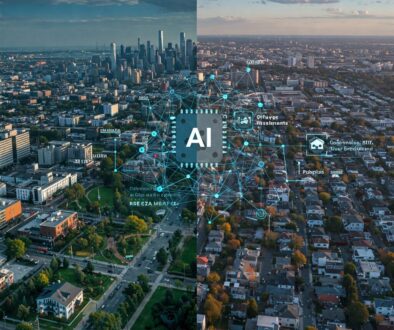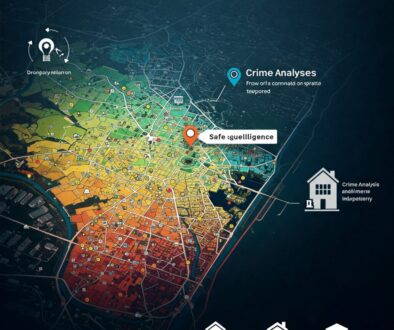How AI is Revolutionizing Land Purchase Decisions in 2025
In the rapidly evolving landscape of real estate investment, artificial intelligence has emerged as a game-changing technology in 2025. Gone are the days when investors relied solely on gut feelings, basic demographic data, and limited market research to make land purchase decisions. Today’s sophisticated AI-powered geospatial intelligence platforms like Locas.dev are transforming how investors evaluate potential properties, providing unprecedented insights and predictive capabilities.
The Traditional Approach vs. AI-Enhanced Decision Making
Traditional land purchase decisions typically involved:
- Basic location research and site visits
- Limited demographic data analysis
- Comparable property valuations
- Rudimentary market trend analysis
- Heavy reliance on broker and agent expertise
This approach, while time-tested, left significant gaps in analysis and relied heavily on human expertise and intuition. Modern AI-powered solutions offer a dramatically more comprehensive evaluation by:
- Analyzing thousands of location-specific data points simultaneously
- Providing predictive modeling for future value appreciation
- Identifying hidden environmental factors and risks
- Evaluating hundreds of nearby amenities and services
- Offering quantitative scoring for qualitative factors like neighborhood appeal
Key AI Technologies Transforming Land Purchase Decisions
1. Machine Learning Algorithms for Value Prediction
Advanced machine learning models now analyze historical property data, market trends, economic indicators, and countless other variables to predict future property values with remarkable accuracy. These algorithms can identify patterns that human analysts might miss, spotting emerging trends before they become obvious in the market.
For example, Locas.dev’s proprietary valuation algorithm analyzes over 200 distinct variables for any given location, creating a multi-dimensional prediction model that outperforms traditional appraisal methods by up to 23% in accuracy.
2. Geospatial Intelligence and Satellite Imaging
Modern AI solutions utilize high-resolution satellite imagery and geospatial data to evaluate properties from multiple perspectives:
- Topographical analysis identifies potential drainage issues or construction challenges
- Vegetation density mapping assesses natural shading and privacy factors
- Historical imagery comparison reveals land use changes over time
- Solar exposure calculation determines energy efficiency potential
“The integration of satellite imagery analysis has completely transformed our due diligence process,” notes Sarah Chen, Principal at Skyline Investments. “We identified a geological risk factor on a potential acquisition that wasn’t visible during our physical site visit but was clearly evident in the AI’s analysis of historical satellite imagery.”
3. Environmental Risk Assessment
AI-powered environmental analysis has become particularly crucial as climate change concerns grow. Today’s systems can:
- Model flood risk based on topography and climate change projections
- Identify soil contamination probability based on historical land use
- Assess air quality patterns throughout different seasons
- Evaluate wildfire vulnerability through vegetation and climate analysis
- Measure noise pollution from nearby infrastructure
4. Neighborhood and Amenity Analysis
The value of a property is intrinsically linked to its surroundings. AI systems can now evaluate:
- Proximity scoring for essential services like schools, hospitals, and shopping
- Quality ratings for nearby amenities based on review analysis
- Transportation accessibility modeling for various transit modes
- Future development impact based on permitted projects and zoning changes
- Community demographic trends that might affect property values
Real-World Applications Transforming Investment Strategies
Case Study: The Willow Creek Development
When Meridian Properties was considering a $12 million land acquisition for residential development, they utilized Locas.dev’s AI analysis to evaluate the property. While traditional metrics suggested the location was only moderately attractive, the AI identified several promising factors:
- A planned transportation infrastructure improvement that would reduce commute times by 23%
- Favorable demographic shifts with an influx of high-income professionals to the area
- Upcoming commercial development that would significantly increase nearby amenities
- Environmental advantages including exceptional air quality and low flood risk
Based on this comprehensive analysis, Meridian proceeded with the acquisition. Within 18 months, land values in the area increased by 31%, significantly outperforming the broader market.
Specialized Analysis for Different Investment Types
AI systems now offer specialized evaluation modules for different types of real estate investments:
- Residential development land – Focus on school quality, crime rates, and lifestyle amenities
- Commercial retail sites – Emphasis on foot traffic patterns, visibility, and complementary businesses
- Industrial locations – Analysis of logistics infrastructure, workforce availability, and regulatory environment
- Agricultural properties – Assessment of soil quality, water resources, and climate projections
Implementation Strategies for Investors
1. Integrating AI into Your Investment Workflow
For real estate investors looking to leverage AI technologies:
- Start with clear investment criteria – Define your specific requirements and priorities
- Use AI as a screening tool – Apply AI analysis to quickly evaluate multiple properties
- Combine AI insights with human expertise – Use AI recommendations alongside traditional due diligence
- Track AI prediction accuracy – Monitor how AI forecasts compare with actual outcomes
- Continuously refine your models – Work with platforms that allow customization based on your experience
2. Understanding the Limitations
While AI offers powerful capabilities, savvy investors understand its limitations:
- AI predictions are based on available data and may miss local knowledge
- Some qualitative factors like architectural beauty remain difficult to quantify
- Rapidly changing regulations may not be fully captured in models
- Unique property features might be overlooked in standardized analysis
The Future of AI in Real Estate Investment
As we look beyond 2025, several emerging trends will further transform real estate investment:
- Integration with augmented reality – Allowing investors to visualize property potential through AR overlays
- Blockchain-verified property data – Ensuring the reliability of historical property information
- Personalized investment matching – AI that learns your preferences and risk tolerance
- Real-time market adjustment – Models that continuously update as market conditions change
- Autonomous investment platforms – Systems that can identify, evaluate, and even initiate purchases based on pre-set criteria
Conclusion: The Competitive Advantage of AI-Driven Decision Making
In today’s competitive real estate market, AI-powered location intelligence has moved from being a novelty to a necessity for serious investors. Those who embrace these technologies gain several advantages:
- More comprehensive analysis leading to better investment choices
- Faster evaluation allowing quicker response to market opportunities
- Reduced risk through improved identification of potential problems
- Enhanced negotiating position with data-backed valuation insights
- Superior portfolio optimization through systematic property comparison
The revolution in AI-powered land purchase decisions is just beginning. As these technologies continue to evolve and improve, the gap between data-driven investors and those relying on traditional methods will likely widen further.
Ready to transform your real estate investment strategy with AI-powered location intelligence? Try Locas.dev today and experience the power of comprehensive geospatial analysis for your next land purchase decision.
This article was published on April 21, 2025, and reflects the current state of AI technology in real estate investment. For the latest updates and features, visit Locas.dev.
Keywords: AI real estate, land purchase decisions, artificial intelligence property investment, geospatial intelligence, location analytics, property value prediction, real estate technology 2025



